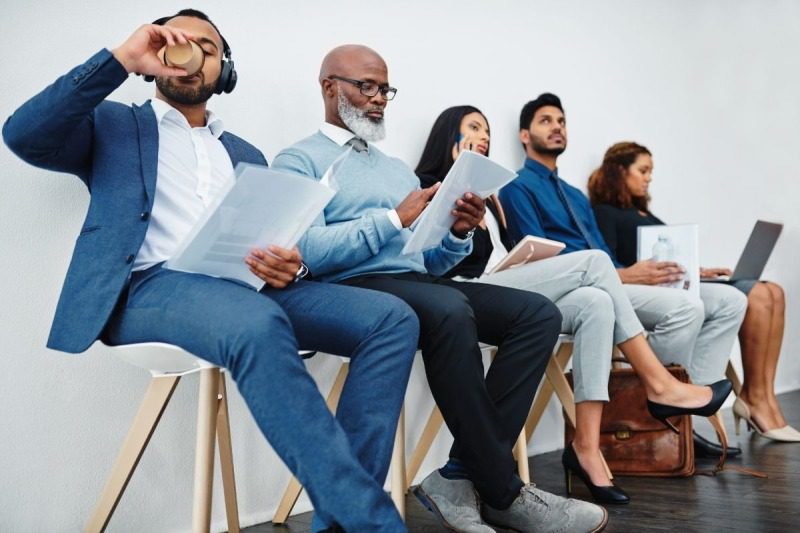
What you wear to a job interview matters. Research suggests that people make a first impression within the first 7 seconds of meeting someone. Your hair, clothing, and shoes can be a huge giveaway about who you are as a person.
Nevertheless, choosing your interview outfit can be tricky to get right.
The clothes you should wear will vary depending on the type of job you’re going for. Generally speaking, corporate interviews will require smarter clothing, while less formal interviews will need casual clothing.
This doesn’t mean that you should wear a ball gown or your sweatpants though!
If you’re stressing over what to wear to your next interview, you’re in the right place! We’ll cover the best ways to dress for an interview within this article. You’ll also find advice on other things you should bring to the interview, as well as the items that you should leave at home.
Table of Contents
Dress Up, Rather Than Down
Every company has a different dress code. Graphic design brands may judge those who wear suits and ties, while private firms may disapprove of jeans and sweatshirts.
Before you go into the interview, try to do your research into the corporate culture to get a better idea of how the employees dress.
While it’s best to wear clothes like everyone at the company wears, you should always note how your look will appear to others. Jeans and sneakers may be fine to wear once you’ve landed the position, but they’re rarely good interview attire.
When in doubt, dresses and heels or a blazer and a tie will always make a better impression.
What To Wear To A Corporate Interview
Interviews at traditional white-collar industries, like banking, insurance, or finance, will always call for formal clothing. Women will need a skirt and blouse or a pantsuit. Men should go for a suit and tie.
Women
Women generally have more clothing choices, which makes choosing an interview outfit harder compared to men. Many factors go into outfit selection for women, like whether you should wear bare legs with a skirt, or if you should or shouldn’t show cleavage.
Women should also take accessories and jewelry into account when selecting their outfits. Bags should be able to fit a resume inside, but shouldn’t be ostentatious.
Similarly, any jewelry should be simple and refined. Dangling earrings, chunky bracelets, and loud necklaces should be avoided completely.
Makeup should also be light. This isn’t the best time to be wearing a red lip! Foundation is fine as long as it doesn’t look cakey.
Don’t overdo the perfume either, no one should be smelling you before you enter a room. Nails should be neat and manicured. Go for nude colors instead of red, neon, or sparkly nails.
Here are the main guidelines for women at a corporate interview.
- Suit in neutral colors, like black, navy, or dark gray.
- Skirt suit either just above or just below the knee
- Complementary blouse
- Shoes with a mid to low heel
- Simple or no jewelry
- Avoid cheap or tarnished jewelry
- Neat, put together hairstyle
- Clean, manicured nails
- Pantyhose in black or nude
- Briefcase or portfolio
Men
Men who have corporate interviews should stick to conservative clothing. The default option is always a suit. Make sure your clothes are free from loose threads, fit well, and have no stains.
Here are the main recommendations for men who have a corporate interview.
- Suit in one neutral color, like black, navy, or dark gray
- Color coordinating or white long sleeve shirt
- Leather belt
- Tie
- Dark socks and classic leather shoes
- No jewelry apart from watch and cufflinks
- Neat hairstyle
- Light aftershave
- Trimmed, neat nails
- Briefcase or portfolio
What To Wear To A Casual Interview

When the interview is for a less formal company, the dress code may be more casual. However, casual doesn’t mean careless! Here are some guidelines for casual interviews.
Business Casual
You don’t need a suit and tie, but you should leave the jeans and sneakers at home too. Any attire that would be worn at the gym or club should also be avoided. Long-sleeved button-down shirts and well-fitting trousers are good options for men.
Women have more options to choose from, but in most cases, blazers, well-fitting pants, and below-the-knee skirts are all nice choices.
Startup Casual
Jeans can be worn at a startup interview, but they shouldn’t have any holes or rips in them. The idea is to make a good impression, so it’s fine to dress up a little more than the current employees.
No Dress Code
If the company hasn’t got a dress code, err on the side of caution and stick to professional attire. Business casual clothing is your best bet.
How To Make A Good Impression With Clothing
Make sure that your planned outfit fits correctly well before your interview. Iron your clothes and get them ready the night before, so you don’t have to rush too much in the morning. Similarly, if your shoes need polishing, do this the day before so you can be sure they look right in the light.
Remote interviews are growing in popularity, but it’s easy to wear the wrong things on camera. Avoid bright or garish colors, but make sure that you don’t wear the same color as your background, as your head may look like it’s floating.
Things To Bring To The Interview
Here’s a list of other things that you should bring to the interview. Make sure that you have these ready the night before so you’re well prepared.
- Directions and location of the interview
- Name and number of interviewer or company
- Photo ID
- Notebook and pen
- Few resume copies
- List of a few references
- Breath mints
Depending on the job, you may want to bring samples of previous work, as well as a tablet or laptop to present. You should also make sure that your phone is on silent during the interview, as phone calls and texts can be distracting.
Things You Shouldn’t Bring To The Interview
Here are some things that you shouldn’t bring to the interview.
- Chewing gum
- Soda or coffee
- Extra jewelry (if you have a lot of piercings, consider removing some of them before the interview.)
- Hide tattoos with makeup or clothing
In Summary
Appropriate interview attire depends on the type of interview it is. Corporate industry interviews will call for formal attire, while start-up companies will need slightly casual clothing. If you’re in doubt, it’s best to dress up rather than down.
Always keep your clothing clean, neat, and ironed, as creases, stains, and rips may give the wrong impression.









